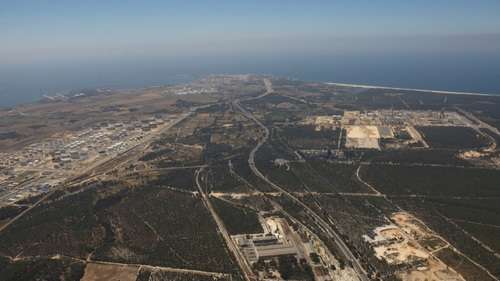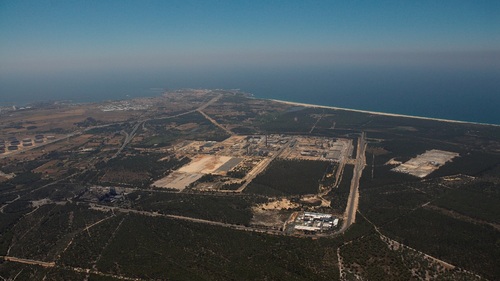Repsol is expanding its chemicals complex in Sines, Portugal
Repsol SA is adding new units to expand production of specialty chemicals at Repsol Polímeros, chemical complex at the Sines Industrial and Logistics Zone, about 5 km northeast of Sines, Portugal, 150 km south of Lisbon.
Repsol as a Company has started its activities in 1990 in the country and the organic growth in this industry is always challenging but provides a great experience in dealing with central and local administrations. Buying an already established site has its own challenges due to the different cultures of the Companies but adds people with great knowledge of the country and activity.
The sustainability of Repsol Polímeros requires the highest rates of integration and flexibility in the site, which is the aim of the investment that is currently taking place. The Company has always known that, but the external conditions were not there, and the growth of the chemical market, the necessity of circularity and energy transition, currently taking place is a good opportunity for this site and the Company. In that sense Repsol has a clear strategy for industrial transformation of its sites to keep them competitive, sustainable, and aligned with net zero goal in 2050. Repsol believes that now is the right time to invest in these future technologies that will help sustain and reinforce its leadership in this business in Portugal and Iberia.
Repsol is currently building two new linear polyethylene and polypropylene plants, involving an investment of 657 million euros, which corresponds to the largest industrial investment in Portugal in the last 10 years, considered to be of potential national interest.
In total the Company has 1435 direct employees in the country, of which over 570 in Repsol Polímeros. These are people with technical backgrounds in engineering and industrial operations. Other support activities are area management related.
During the expansion phase, it is estimated that an average of 550 direct jobs will be created, with the number rising to over 1,000. In the operating phase, an increase in staff of around 75 direct jobs and 300 indirect jobs are expected.
Portugal has very qualified people and Repsol has managed to recruit and train the people we need. The biggest challenge has been to find accommodation for these people to live in Sines.
For Repsol, the customer is at the center of its strategy, which is why the objective is to meet all consumer energy needs, at home or on the move. The Company is increasing the presence of low-emission energies in its product and service portfolio, while relying on digitalization for the development of new commercial products and channels that will help them build a more personalized relationship with their customers.
Repsol has had customers in Portugal since the eighties of the last century, however our physical presence was reinforced in 2004 with the acquisition of the Sines site. Since then, the Company has been investing in the efficiency, security, environmental performance, human capital, digitalization, and more recently in the expansion and decarbonization of the site and the materials we produce.
They are a leader in the chemical business in Iberia and in the enlarged region of this Mediterranean area, although their production goes to other continents other than Europe. Having their industrial base in Spain, Portugal is a natural territory for the expansion of their activity as the economic border does not exist and the technologies present in Sines are very complementary to their sites in Tarragona and Puertollano in Spain.
Portugal is an EU country that shares a common agenda with Spain and the Iberian Peninsula is very integrated in economic terms, in the energy arena, in logistics, etc.
Sines has very good port facilities and is developing rail and road connections to the EU, the main market for the company’s exports.
The industrial business is evolving according to the business cycles. The commercial businesses depend a lot on prices and taxation.
The industrial and the business activities work together towards a common goal of leading the energy transition and achieving zero net emissions by 2050, in fact Repsol was the first company in the sector to sign up to this goal.
Their current focus is the expansion project so that they can produce 100% recyclable polymers. In parallel they are investing in the decarbonization processes. These include logistics optimization, digitalization, electrification, renewables production for own use and renewable hydrogen production for added value materials.
The Company is using new technology and digital solutions to transform its facilities into multi-energy hubs that will be able to treat any type of waste and manufacture renewable fuels and fuels with a low, zero, or even a negative carbon footprint.
The new materials produced will be 100% recyclable, as the rest of Repsol's polyolefins, and they can be used for highly specialized applications aligned with the energy transition in the pharmaceutical, automotive, and food industries. The facilities will be operational in 2025 and will consolidate the Sines Industrial Complex as one of the most advanced in Europe due to its flexibility, high degree of integration, and competitiveness.
In its 2021-2025 Strategic Plan, Repsol contemplates a total investment of €19.3 billion for the period, including numerous actions to develop its industrial business, which is already characterized by its high competitiveness and leading position in Europe. This business is of great importance for the creation of high-quality employment, competitiveness, and wealth, and it will continue to be capable of providing society with the goods it needs, with a low, zero, or even a negative carbon footprint.
Repsol is already transforming all its industrial complexes into multi-energy hubs, equipping them with the latest technologies that enable them to decarbonize their processes by improving energy efficiency, promoting the circular economy, producing renewable hydrogen, and increasing capture and use of CO2.
Repsol manufactures and markets a wide variety of polymer products, including a wide range of polyolefins with a high degree of differentiation, all of which are 100% recyclable. The Company is committed to an efficient chemicals business with products with a lower carbon footprint and geared towards the circular economy. One of its strategic objectives is to recycle the equivalent of 20% of its polyolefin production by 2030.
These chemical products are present everywhere in everyday life, they will play a leading role in achieving a less carbon-intensive future. They help improve energy efficiency thanks to their specific properties, including a reduction in the weight of materials that contribute to lower energy consumption in mobility as well as better insulation for buildings and homes.
aicep Global Parques, the manager entity of ZILS – Sines Industrial and logistic Zone, and its main shareholder, Aicep Portugal Global, the direct foreign investment office have had a very important role during Repsol’s decarbonization investments, be it acting as facilitator and focal point in these centralized contacts with central and local administrations or as account managers during the process of accreditation as relevant projects known as PIN – projects of national interest, a one stop shop concept for permitting foreseen in the Portuguese legislation.
Categories
Investments
2021-01-01
€ 657 mln at ZILS - Sines Industrial and Logistics Zone (PT)Countries
Companies


aicep Global Parques

ZILS - Sines Industrial and Logistics Zone
Sines, Setubal, PortugalTotal area: 2375.0ha
Free: 590.4ha
Latest news
INEOS launches €250m investment supported by the French Government to secure the future of French industry at Lavera
The project marks the first phase of a long-term regeneration plan to reduce emissions, boost reliability, efficiency and competitiveness, with support of the French State.
Hycamite’s technology to decarbonize shipping awarded AiP by industry leader DNV
Kokkola Industrial Park →Hycamite’s proprietary Thermo-Catalytic Decomposition (TCD) technology offers a new approach to producing clean hydrogen by breaking down methane, the primary component of liquefied natural gas (LN...
Clariant catalysts will power the Ecoplanta: Europe's first waste-to-methanol plant
Chemmed Cluster Tarragona →Repsol is building Europe’s first plant to produce renewable methanol from urban waste The facility will use Enerkem gasification technology to produce 240 KTA of methanol Clariant will supply cata...
Lilly plans to build a new $3 billion facility to boost oral medicine manufacturing capacity in Europe for patients worldwide
Netherlands site will bring 500 manufacturing and 1,500 construction jobs while further strengthening Lilly's global supply chain
